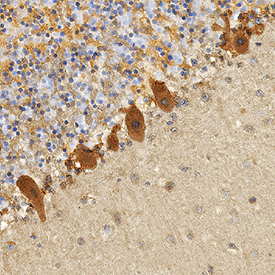Human TAFA5/FAM19A5 Antibody Summary
Gln26-Ser125
Accession # NP_056196
Applications
Please Note: Optimal dilutions should be determined by each laboratory for each application. General Protocols are available in the Technical Information section on our website.
Scientific Data
 View Larger
View Larger
TAFA5/FAM19A5 in Human Cerebellum. TAFA5/FAM19A5 was detected in immersion fixed paraffin-embedded sections of human cerebellum using Human TAFA5/FAM19A5 Monoclonal Antibody (Catalog # MAB5148) at 15 µg/mL overnight at 4 °C. Before incubation with the primary antibody, tissue was subjected to heat-induced epitope retrieval using Antigen Retrieval Reagent-Basic (Catalog # CTS013). Tissue was stained using the Anti-Mouse HRP-DAB Cell & Tissue Staining Kit (brown; Catalog # CTS002) and counterstained with hematoxylin (blue). Specific staining was localized to Purkinje neurons. View our protocol for Chromogenic IHC Staining of Paraffin-embedded Tissue Sections.
Reconstitution Calculator
Preparation and Storage
- 12 months from date of receipt, -20 to -70 °C as supplied.
- 1 month, 2 to 8 °C under sterile conditions after reconstitution.
- 6 months, -20 to -70 °C under sterile conditions after reconstitution.
Background: TAFA5/FAM19A5
TAFA5 (also FAM19A5) is a 14 kDa type I transmembrane protein and member of the FAM19/TAFA family of chemokine-like proteins (1). Human TAFA5 is 132 amino acids (aa) in length. It contains a 15 aa extracellular domain, a 23 aa transmembrane sequence, and a 95 aa cytoplasmic region. Alternate splicing produces two additional isoforms. Isoform 2, a secreted form, has a 31 aa substitution for residues 1‑38 in isoform 1. Isoform 3 has an eight aa substitution for residues 1‑87 in isoform1. Human TAFA5 is 100% aa identical to mouse TAFA5 (1). Within the TAFA family, TAFA5 is the most distinct member, while TAFAs 2, 3, and 4 are the most closely related members (1). Real-time PCR analysis indicates that TAFA5 mRNA expression is restricted to the central nervous system (CNS), with the highest level in the basal ganglia and cerebellum (1). The biological functions of TAFA family members are not yet known, but there are a few tentative hypotheses. First, TAFAs may modulate immune responses in the CNS by functioning as brain-specific chemokines, and may act with other chemokines to optimize the recruitment and activity of immune cells in the CNS (1). Second, TAFAs may represent a novel class of neurokines that act as regulators of immune nervous cells (1‑2). Finally, TAFAs may control axonal sprouting following brain injury (1).
- Tang, Y.T. et al. (2004) Genomics 83:727.
- Benveniste, E. (1998) Cytokine Growth Factor Rev. 9:259.
Product Datasheets
FAQs
No product specific FAQs exist for this product, however you may
View all Antibody FAQsReviews for Human TAFA5/FAM19A5 Antibody
There are currently no reviews for this product. Be the first to review Human TAFA5/FAM19A5 Antibody and earn rewards!
Have you used Human TAFA5/FAM19A5 Antibody?
Submit a review and receive an Amazon gift card.
$25/€18/£15/$25CAN/¥75 Yuan/¥1250 Yen for a review with an image
$10/€7/£6/$10 CAD/¥70 Yuan/¥1110 Yen for a review without an image

